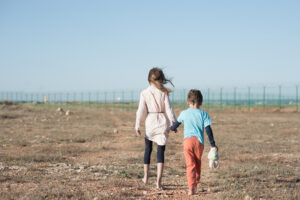Compassion not confrontation: Migration and the Catholic Church
Compassion not confrontation: Migration and the Catholic Church
Since becoming pontiff, Pope Francis has repeatedly sought to encourage a message of compassion with regards to migrants arriving in Europe. Whilst much of the Catholic clergy has followed this lead, right-wing populists have threatened the leadership of the Church.
Ever since becoming the pontiff in 2013, Pope Francis has sought to make the Catholic Church a leader in promoting a sympathetic and compassionate response to the challenge that migration from Africa and the Middle East has posed to Europe. The content of Francis’s position regarding migration was summarised by his emphasis on Catholics following four words with regards to migrants arriving in Europe: “to welcome, to protect, to promote and to integrate.”[1]
Yet, as this two-part article will seek to show, whilst many senior members of the Catholic clergy have been keen supporters of Francis’s message, the liberal position of the Vatican has not always translated to all followers of the Church. Therefore, this first article will look at the way in which clergy across Europe have adhered to Francis’s pleas for compassion, whilst the second will look at the challenges that it has faced among European Catholics.[2]
Compassion for migrants and refugees
Whilst many European leaders have often adapted their view and message on migration depending on political concerns, Pope Francis has been clear and consistent since ascending to the papacy in 2013. In fact, the pope’s position on the issue of migration has been clear from the start, when he chose to make his first pastoral visit beyond Rome to give mass on the tiny island of Lampedusa, an Italian territory in the Mediterranean, where migrants coming from North Africa were being processed.[3]
The pope has continued to regularly discuss his views on migration and has both emphasised the need for compassion and welcome from followers of the faith, whilst also putting his own words into action, with symbolic gestures like taking a dozen highly vulnerable refugees who were facing deportation from the Greek island of Lesbos back to Rome.[4]
Finally, Francis has also sought to stress not only how Catholics and Christians should act with regards to refugees and migrants, but also has warned of the fact that migration is likely to increase in the future due to the effects of climate change.[5] In this sense, Francis’s liberal views on migration are not only significant in the current moment but may define the Catholic Church’s position as the challenge only increases in the coming decades.
German Catholics follow the Vatican
Across Europe, members of the Catholic clergy have, for the most part, repeatedly stressed Pope Francis’s liberal message with regards to migration. One of the clearest examples of this has been in Germany, where various members of the clergy expressed their endorsement of Francis’s message in different ways.
Perhaps the most widespread evidence of bishops in Germany demonstrating their support for helping migrants was the large amount of aid given by German Catholics at the worst of the crisis in 2015, in a campaign led by bishops. During this year, 112 million euros was raised for migrant aid organisations and at least 1,381 churches in Germany provided lodging for around 28,000 refugees.[6] Cardinal Reinhard Marx, who led this campaign, continued to demonstrate the Church’s position five years after the largest wave of the crisis, when he committed a donation of 50,000 euros to a charity that supports migrant rescues at sea. [7]
In addition to this direct support, there have also been a number of examples in Germany of clergy members who have been willing to challenge civil authorities in order to try to help migrants. For example, a church in Hamburg offered their space as a safe house for migrants to be protected from being deported by German authorities. Between 2018-2019 there had been an increase from 374 active church asylum cases up to 532, demonstrating how certain parts of the German Catholic Church had not only maintained their commitment to protecting migrants, but had in fact deepened it. [8]
Finally, at the most dedicated end of the spectrum, there is the case of Mother Mechthild, a German nun who has faced trial proceedings for offering church asylum to migrants in the state of Bavaria. Whilst Mechthild has been threatened with a prison sentence, she has also won a peace prize for her actions. She has managed to offer church asylum to around 30 people since 2016.[9]
On the frontline
Meanwhile, as the German Catholic Church has led attempts to integrate migrants and prevent their deportation, Catholic clergy in the Mediterranean have often been more focused on providing immediate aid to those who have just arrived in Europe.
In Italy, various leading figures have repeatedly stressed the need to follow Francis’s call for understanding when it comes to the question of migrants arriving in the country. One example was the position of Archbishop Francesco Montenegro who represents Sicily and whose diocese included the island of Lampedusa, where many African migrants have arrived in the last decade. In 2015, Montenegro was described as a “tireless advocate for migrants,” having previously referred to them as a “sacrament of God’s presence to us.”[10] This attitude has continued until the present day, when in 2021 another Sicilian Bishop, Antonio Stagliano, said that saving migrants in danger in the Mediterranean sea was a “duty that cannot be given up” and that is in an “image of God.” [11]
Whilst in Italy, clergy members have led calls for greater action to help migrants, in the Spanish territory of the Canary Islands, the Church has been crucial to providing first-hand aid as local authorities have been overwhelmed by an increase in arrivals. In November 2020, as the arrivals to the Canaries rapidly increased, the parish clergy in Tenerife offered food and hospitality to migrants.[12] This fight has continued in recent months, with the Archbishop of the Canaries condemning both those who promote hateful ideologies against migrants, and the lack of preparation by the government for how to deal with the challenge.[13]
Therefore, as demonstrated in this article, it is clear that among clergy members at the highest levels of the Catholic Church, Pope Francis’s calls for compassion for migrants have been incorporated and enacted in a variety of ways. However, as the second part of this article will seek to show, the question of whether Catholic citizens and their favoured political representatives have done the same is somewhat more complex.
Interested in similar topics? Go to our Dashboard and get free updates.
Sources
[1] Pope Video – Migrants & Refugees Section
[2] It should be noted that throughout this article the word ‘migrants’ is used to describe those arriving in Europe from Africa and the Middle East. Whilst in many cases these people are refugees, the use of the word migrants is a more all-encompassing term and is therefore used.
[3] Pope Francis visits Italy’s migrant island of Lampedusa
[4] Pope Francis takes refugees to Rome after Lesbos visit
[5] Pope Francis brings spotlight to climate migration: ‘Many are being devoured in conditions that make it impossible to survive’
[6] German Catholic Church raises 80 million euros in migrant aid in first half of 2016
[7] AfD criticizes German cardinal over sea rescue donation
[8] Church sanctuary for migrants: A wrinkle in EU immigration crisis
[9] Mother Mechthild: ‘I am not a criminal’
[10]‘Migrant people are our brothers’: Cardinal-Elect Francesco Montenegro, Agrigento, Italy
[11] Italian bishop calls for end to indifference after ‘shameful’ migrant deaths
[12] La Iglesia en Canarias rescata a los migrantes: invasión de humanidad
[13] La Iglesia canaria ve “inaceptable” la “ideología que justifica el racismo y xenofobia”






